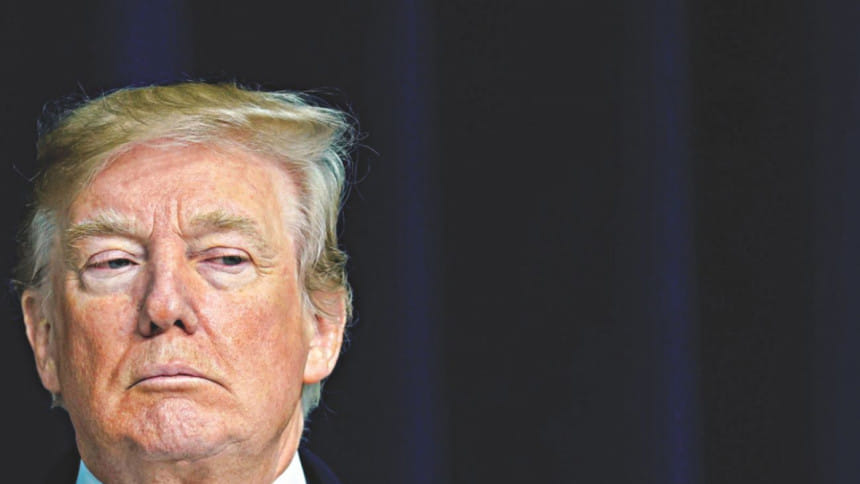Iconoclast Donald J Trump?

To any question whether the US president and commander-in-chief is working against the country, Donald J Trump's tenure already supplied an overwhelming positive answer, even before he dramatised them all in Finland during mid-July 2018. We just preferred to look away.
We can discard principles, measuring which leaves us fudging with intangibles. We have come, for example, to a stage in the United States where snatching babies and children from migrant parents is not considered a human rights violations to some, while to others it becomes a lesser evil than illegal migrants settling in the country. What was enshrined as a constitutional right by the country's hallowed Founding Fathers is now subject to a liberal or conservative (or even fascist) interpretation in which fewer and fewer US citizens find themselves on the same liberal/democratic page.
Institutional evidences leave a narrower error margin, well captured by the iconoclastic term. Meaning "to break images" (to wit, icons), since institutions give images feet, hands, and a functional capacity, elaborated in each of their own constitution, they best illustrate the onset of awry conditions. If, for example, we look at post-World War II global leadership, the United States, by dominating that era, built the appropriate institutions: multilateral trade, whose seed was sown in 1947 in Geneva; the North Atlantic Treaty Organization (NATO), which successfully challenged communism from 1949, much to the free-world's relief; and the G7 forum to separate the "cream of cream" industrialised countries in 1975 (driven by the calamitous OPEC oil-price hikes), thereafter annually until 1987, thereafter biennially. All of these institutions had subsidiary agencies, but were, frankly, offshoots of the grand-daddy of them all: another US initiative called the Charter of the United Nations, produced from Eleanor Roosevelt's tireless contributions, against staggering odds, within the same lifetime as the very generation that rejected the League of Nations in 1920.
Turning first to trade, the United States sought, through the 1934 Reciprocal Trade Agreements Act (RTAA) to extend this bilateral framework multilaterally. It failed to establish the International Trade Organization in 1947-8 in Havana, thus leaving the 1947 ad hoc General Trade and Tariffs Agreement (GATT) to struggle, successfully through eight rounds of negotiations, to produce the World Trade Organization in 1995. This monumental, persevering US accomplishment was often challenged by the European Community, particularly over farm trade preferences. It was ceremoniously jettisoned by Trump, though one protectionist gesture after another by just about every president since Richard M Nixon, may institutionalise this mercantilist mindset while deepening this movement. Our generation, and conceivably many after us, will now have to directly or indirectly cough up the extra cash that this will mean to our personal income every time we purchase anything.
Right from his campaign, Trump was determined to make the NATO institution a four-letter word, that is, of the vile type. Arguing the European partners were not doing enough to pay for their own defence, which, by the way, is a solidly correct argument, he originally went out to dismantle the very institution that helped win the Cold War. Just as a qualification: any country can validly make that argument, but one aspiring to be a leader must assume that responsibility to induce the support of others. By supplying something in return, in this case, military security (or relatively open markets), the United States stepped up to the plate in the 1940s. Would the moribund Soviet Union have loved to have Trump on board, since that is precisely what the Warsaw Pact failed to do from 1955? Vladimir Putin, who wants the Soviet aura restored, not to mention czarist suzerainty invested in him, cannot believe hitting his jackpot of squeezing more "juice" out of the United States, and by a US president, like Trump himself.
Trump retreated from his NATO brinkmanship at the organisation's July Brussels 2018 summit, arguing his West European counterparts had increased their proportional contributions. Originally he wanted every member pay two percent of their GDP (gross domestic product) to the NATO budget, or pay back the United States (which pays 3.5 percent of its GDP). For 2018, only four of 26 European NATO members pay that proportion, at least: Greece, Great Britain, Estonia, and Latvia, in order of proportional contributions (Poland is very close, with 1.99 percent; non-European members include Canada, the United States, and Turkey). We must now see what his follow-up measures will be to increments by other members, particularly Canada and Germany, both near the 1.5 percent mark.
It is only a small hop-skip-and-jump to flushing the G7 summit in Canada this June. Trump's refusal to sign the communiqué brought the largest free-trade border in the world into its twilight zone, while widening the Atlantic gap with the other flock of steady friends the United States has had in Europe. All of this is happening just as Russia is consolidating its counterpart alliance, the Shanghai Cooperation Organization, an institution it reluctantly joined after the immediate pangs of post-Soviet humiliation (and still carrying misgivings under Chinese preponderance), but is relishing wielding now (of course, along with China).
Surges to break well established institutions serving global functions have been illustrated here: selectively over trade, security, and economic redistribution (G7), or collectively, as referenced here, through the UN framework (UN). They coexist with surges constructing new institutions, with one key difference: these are largely by dictators, just as the breaking counterparts were democratic. Is the former displacing the latter?
Trump's tenure has prioritised summits with authoritarians (Xi Jinping, Kim Jong-un, Putin, among others), than with their free-thinking counterparts (Angela Merkl and Justin Trudeau), while big-brothering those wedged uncomfortably somewhere else (Emmanuel Macron and Theresa May). How this pans out may be crucial for the globe's future.
Conventional wisdom accents the breaking force before the November 2018 US mid-term election, since the accumulated costs of free-riding the United States may, arguably, be one of the root causes of today's tectonic global changes. Winning votes from a normal population is itself a herculean democratic task, but to win it from a distempered population cannot come without enormous socio-political and socio-economic costs. These can only be taken by going to the extremes of authoritarian control: only by redistributing NATO financial contributions can the old order be sustained, as the popular message seems to be in the country paying the most, the United States.
Should the Republican majorities remain in the two houses, those forces can only institutionalise, strengthening the US pull-back argument. Even if they do not, there is very little Congress can do to revoke the Chief Executive's implemented policies until that office changes. In other words, whatever damage has been done cannot easily be reversed: the rest of the world must fidget to fit into a new world order. If, on the other hand, this is what the US public desires, our tribute to democracy compels that we begin researching its flip side, what Aristotle called "mobocracy", that is, "the perverted" form of "rule of the many". Our future may be too intertwined with it to ignore it now, but it may still be heads above authoritarianism.
Imtiaz A Hussain is the head of Global Studies & Governance Program at Independent University, Bangladesh (IUB).





Comments